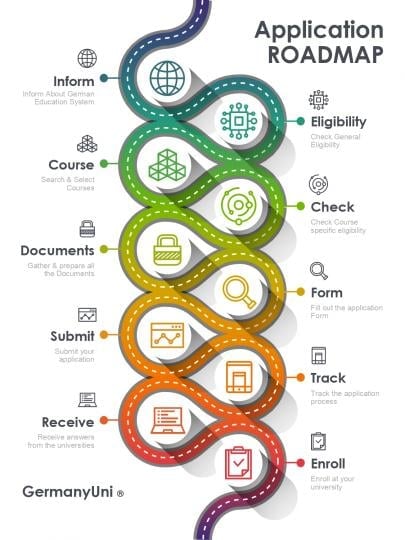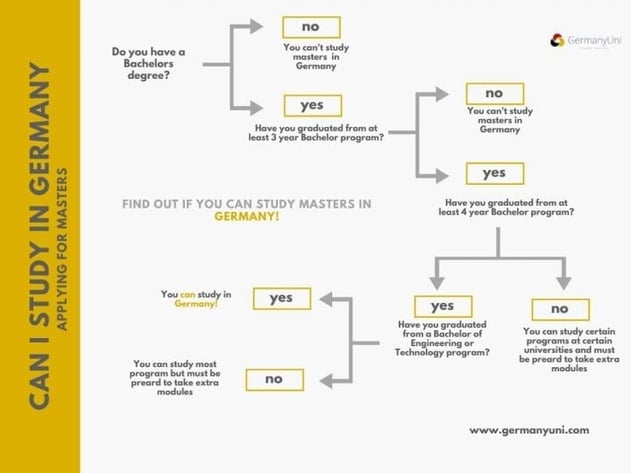From checking out the education system and requirements to finally enrolling at the university, we've got you covered. Read on to find out more about a successful application process for Indian applicants who wish to study in Germany.

1. Inform yourself about the German education system and requirements
“Most times, the way isn’t clear, but you want to start anyway. It is in starting with the first step that other steps become clearer.” - Israelmore Ayivor
The process of researching and informing yourself about the German education system is exactly the first step you need to take and the one which will make all the future way clearer. It is important to highlight that the German education system is different from the Indian. For example, in Germany there are no centralized university entrance exams as JEE in India. Every German university determines its own set of requirements from the applicants and normally the more prestigious university or study program is, the higher are the application requirements. For example, some universities can ask for a B2 level of German and will accept even average grades from previous studies, while other universities may ask for a C1 level of German, plus motivation and recommendation letters and will accept only the students with exceptional academic achievements. It is important to find a university with requirements which you satisfy, not to waste your time on the universities which might have very high standards and low acceptance rates.
So be prepared to invest some time into searching universities and study programs and always rely only on the proven sources like official university pages, for example. Especially if you are looking for the list of documents required or something like that.
2. Check whether you are eligible to study in Germany
Before starting to search for programs, make sure you are eligible to study in Germany. Pay attention to the fact that there is a general eligibility you first need to fulfill to be able to study in Germany. Then, there is also a course specific eligibility for the program you are applying to.
Don’t confuse eligibility for studies in Germany and special requirements that your desired program might have. You can be eligible to study in Germany, but still not fulfill the requirements of the specific university.
Here is an example:
If you have a completed degree in Bachelor of Technology in India, you are eligible to study Masters of Technology in Germany. But if the university requires you to have work experience and you don’t have any, you don’t fulfill the requirements of the university. Still you can look up for another university that doesn’t require work experience.
You can check your eligibility on the websites of uni-assist or Anabin. You can also easily find out if you are eligible with our diagram:


3. Find a suitable course of study
If you are eligible to study in Germany, you should now search for programs to apply. Don’t take this lightly. That might be an actual challenge as there are over 400 universities in Germany with almost 20,000 programs offered. Good advice would be to think in advance of what is important for you, whether you have some university or city preferences. Do you want to live in a small student town or a megalopolis? Would you prefer a small university, where you know everyone, or a huge university, which offers more opportunities and connections? Think of a list of things that might be important for you and it will save you a lot of time later on.
One important decision to make is also the language you will study in. There are English-taught programs at German state universities, but if you speak German, consider studying a course in German language.
Here are three reasons to study in German:
1. If you stay in Germany after your studies, it will be difficult and much more expensive to learn German after you graduate. Even if you don’t stay in Germany, by the time you graduate you will have learned German at mother-tongue level. This will give you many advantages in your work life, (especially in sciences or engineering) regardless if you are going back to India or to another country.
2. You will be able to study all the programs that German universities offer, which are about 20,000 programs. Out of this number only roughly 1,000 programs are offered in English.
3. The competition for English-taught programs is much higher, which means the requirements are often stricter than the ones for German-taught programs. And English-taught programs can have tuition fees even at state universities.
If you are looking for German-taught programs with no tuition fees and no prior German knowledge find them here: Bachelor's Programs, Master's Programs.
4. Check program-specific requirements
After you have decided on the university and program, you must be sure that you fulfill the requirements. A requirement for Bachelor’s applications can be an internship, for Master’s applications, minimum grades or work experience. For some programs, you need to pass a test, an interview or submit an essay.
Be sure that you fulfill the requirements. If you are applying to the most known universities like RWTH Aachen, TU Berlin, FU Berlin, LMU Munich, TU Munich, Uni Heidelberg etc. Please be aware that most applicants are applying to these universities and the competition is high. If you decided to apply to one of those universities we would highly recommend you to apply to at least two smaller and less known universities to make sure that at least one of them accepts you.
5. Prepare all the documents
Documents that a university requires depends on the degree level and program you are applying for. Please make sure you send all the documents to the university that you are applying. Depending on your documents, certified copies and translations can be required.
Following documents are required at almost all universities from Indian applicants:
- C.V.
- Secondary School Marks Statement (all years)
- Secondary School Certificate
- Higher Secondary School Marks Statement (all years)
- Higher Secondary School Certificate
- Language Certificate (if available)
- Passport copy
- Passport photo
- Motivation Letter
- JEE (main and advanced)
Additional documents for Master’s degree applications:
- University Marks Statement (all years)
- University Degree Diploma
- Recommendation Letter
6. Fill out the application form
Before starting to fill out the application forms, make sure you have all your documents by your side to provide precise information. Most universities give you the opportunity to fill out your form online, but you can only access online forms within the application period. It is important to highlight that for most universities online application is not enough. This means that after filling out the application form online, you need to print and sign it and then send it together with all your application documents to the university by post.
Some universities don’t have an online form, then you will receive a PDF document, please fill it out in your PC and not by hand. After filling it out, sign it and send it together with all your application documents, within the deadline, to the university.
7. Submit your application in time
Keep an eye on the deadline! Especially if you are sending your documents from abroad, calculate at least 2-3 weeks of shipping. There are different application deadlines, depending on which university and degree you are applying to. Most university deadlines for direct admission are the 15th of January and the 15th of July. But if you are applying for a preparatory German course at the university the deadlines vary, some applications can be made the whole year, some are in January, May, August and November.
8. Track the application process
Most universities will give you an online account where you can login and track your application. Check your application status at least once a week. Especially before the end of the application deadline. Sometimes the university can have further questions or ask you to submit more documents. Even if your application was offline via a PDF file, check your email inbox regularly, the university could contact you.
9. Receive the final decisions from the universities you are applying for
After all the documents are checked and approved you will receive a final decision from the university. Depending on the channel which you were using before, that would be the application portal, email or post. Normally it would take around 1 to 2,5 months after the deadline for you to receive a final answer.
10. Enroll at the university
The admission letter will give you precise information about the next steps to take. The enrollment is usually in person before the classes start. The list of documents you need for enrollment will be stated in your admission letter. Usually this list would include the originals of the documents you’ve sent as certified copies.
💡 Want to double-check that you meet all requirements?
Review the full admission requirements for German universities. And if you're just starting your journey, our Study in Germany hub has everything you need to plan with confidence.











